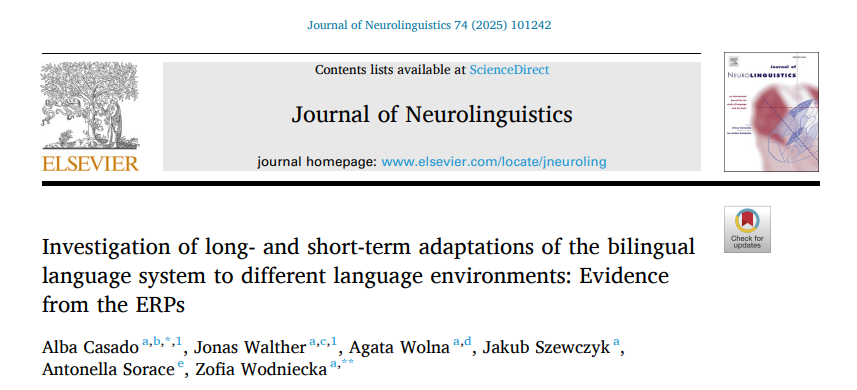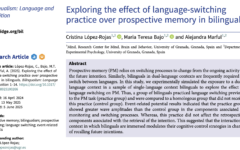New paper published: Investigation of long- and short-term adaptations of the bilinguallanguage system to different language environments: Evidencefrom the ERPs
mayo 28, 2025 2025-06-05 7:21New paper published: Investigation of long- and short-term adaptations of the bilinguallanguage system to different language environments: Evidencefrom the ERPs

New paper published: Investigation of long- and short-term adaptations of the bilinguallanguage system to different language environments: Evidencefrom the ERPs
Does a long-term stay in a foreign language country affect word retrieval in our native language?
And if so, are the effects reversible? The present study explored the neural correlates of singleword production in the native language and their dynamics due to two types of changes in the
language environment: long-term immersion in a foreign language (L2) environment and shortterm reimmersion in a native language (L1) environment. We tested Polish-English migrants
living in the UK (L2 environment) for an average of ten years and Polish-English controls living in
Poland (L1 environment). All participants performed an L1 picture-naming task while we
recorded their electrophysiological responses. The migrants were tested before and after visiting
the L1 environment, while the controls were tested twice in their L1 environment. Our focus was
on two event-related components previously associated with the ease of lexical access: P2 and
N300. We found no modulations related to N300, but some in the P2 time window, although their
distribution was more frontal than previously reported. There was no main effect of the long-term
immersion in the L2 environment, suggesting that the effectiveness of producing words in L1 was
similar across the two groups. However, the short-term change in the language environment
modulated the early positivity in migrants: smaller frontal positivity was reported in response to
picture naming after the short reimmersion in the L1 environment than during the L2 immersion.
These results indicate that the short-term changes in the language environment induce modulations in the neural response, which may reflect higher proactive control applied in L1 production
during L2 immersion and its reduction after short-term L1 immersion.
Casado, A., Walther, J., Wolna, A., Szewczyk, J., Sorace, A., & Wodniecka, Z. (2025). Investigation of long-and short-term adaptations of the bilingual language system to different language environments: Evidence from the ERPs. Journal of Neurolinguistics, 74, 101242. https://doi.org/10.1016/j.jneuroling.2024.101242







